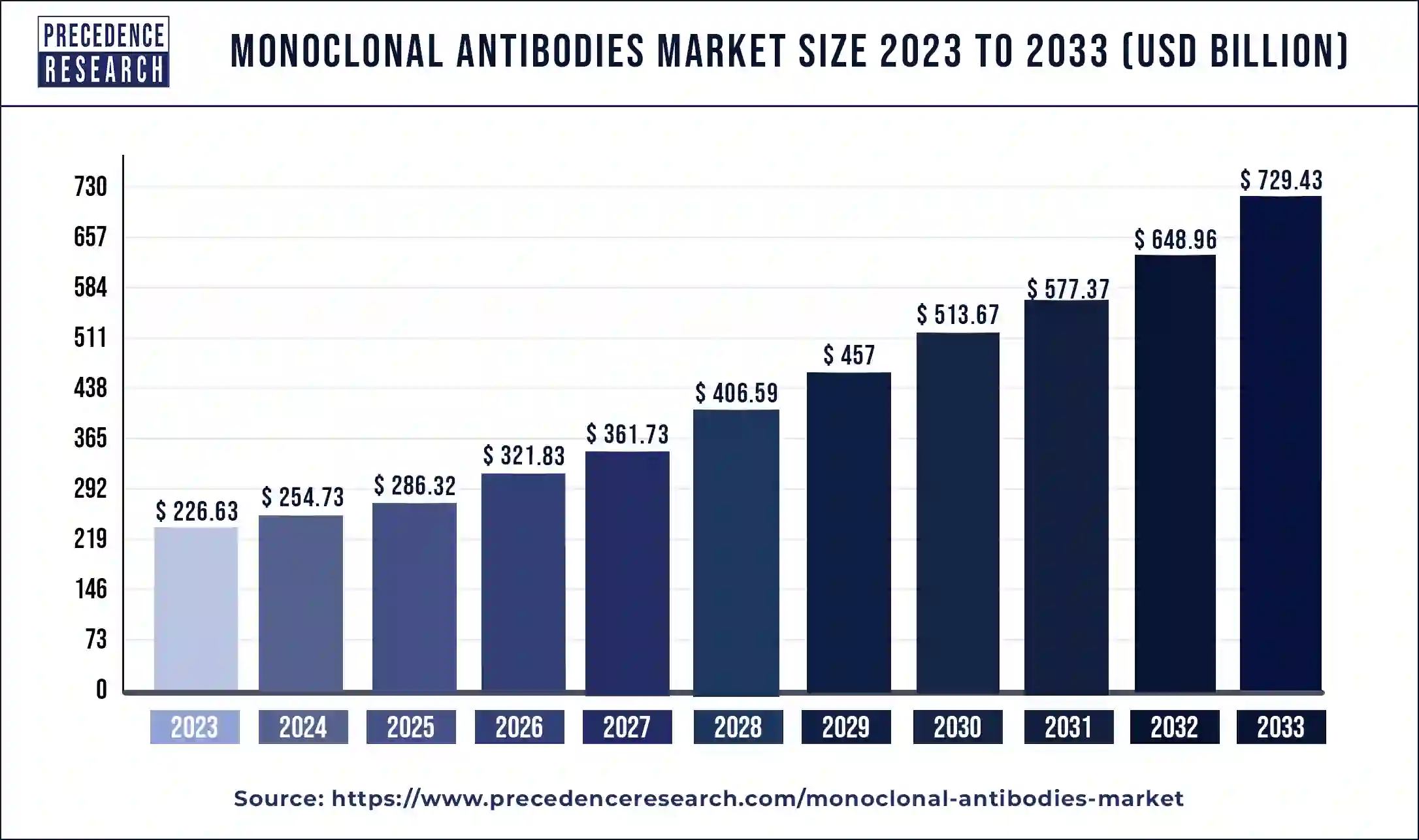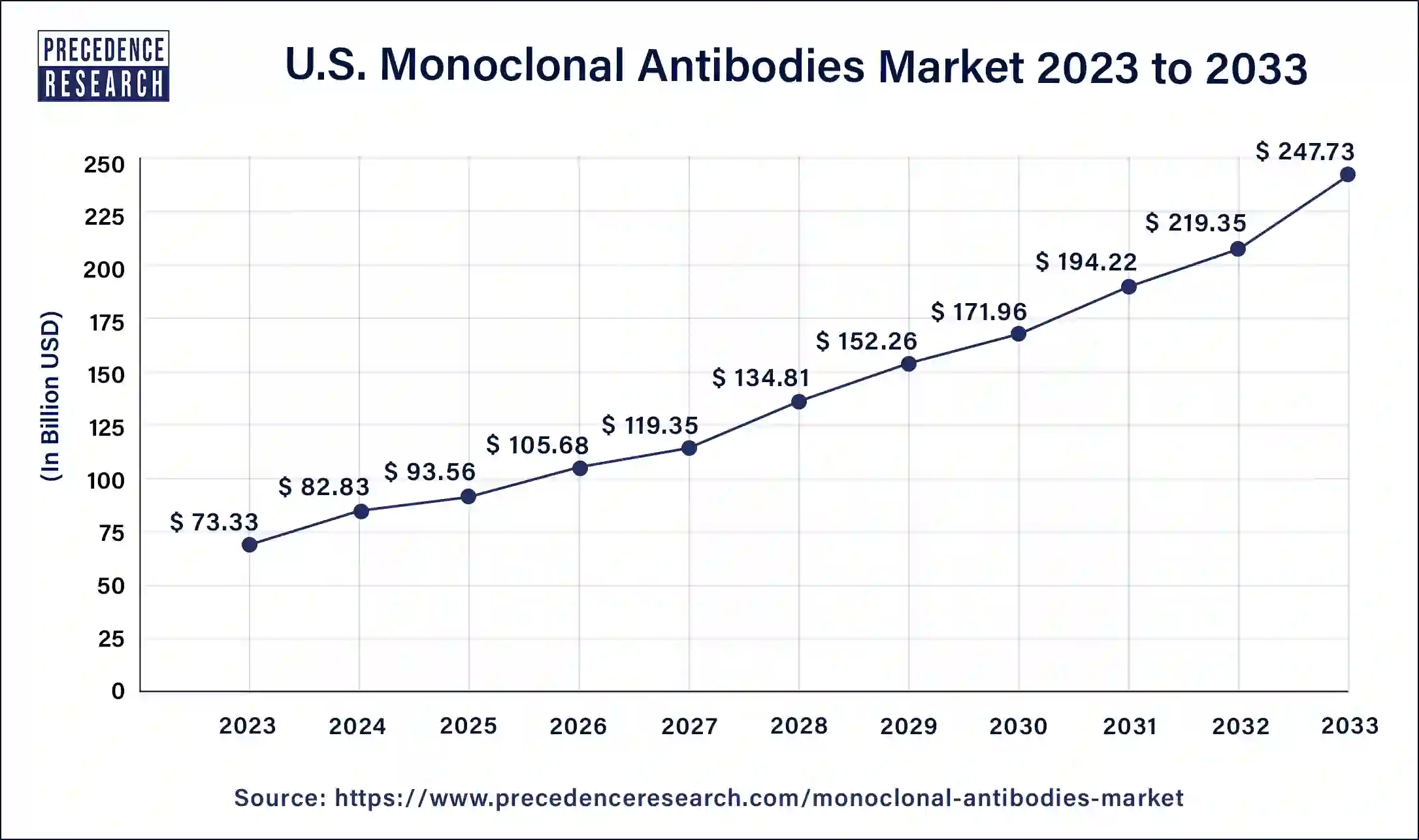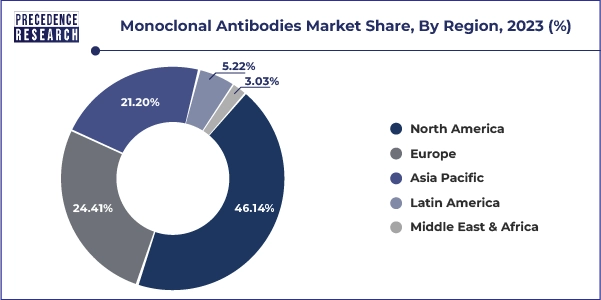November 2023
Monoclonal Antibodies Market (By Source: Humanized mAb, Human mAb, Murine mAb, Chimeric mAb; By Indication: Cancer, Autoimmune Diseases, Inflammatory Diseases, Infectious Diseases, Others; By Distribution Channel: Hospital Pharmacy, Online Pharmacy, Retail Pharmacy; By Production Methods: In Vivo, In Vitro) - Global Industry Analysis, Size, Share, Growth, Trends, Regional Outlook, and Forecast 2024 – 2033
The global monoclonal antibodies market size was estimated at USD 226.63 billion in 2023 and it is projected to surpass around USD 729.43 billion by 2033, registering growth at a CAGR of 12.4% from 2024 to 2033.

The U.S. monoclonal antibodies market size was estimated at USD 73.33 billion in 2023 and is predicted to be worth around USD 247.73 billion by 2033, at a CAGR of 12.9% from 2024 to 2033.

North America accounted largest revenue share 46.14% in 2023. The increased prevalence of chronic diseases in North America, presence of advanced healthcare infrastructure, rapidly ageing population, high healthcare expenditure, and increased awareness regarding the mAbs among the population has led to the higher demand for the monoclonal antibodies in North America. According to the American Cancer Society, more than 1.8 million new cancer cases and around 606,520 deaths were reported in the US in 2020. It is estimated that the US population will have around 24% geriatric people aged 65 years or above by 2060.
Asia Pacific is estimated to be the most opportunistic market during the forecast period. The rising consumption of processed food, growing prevalence of smoking, and rising consumption of tobacco are the major factors that are expected to boost the prevalence of cancer and other chronic diseases among the population. The rising government investments in the development of advanced healthcare infrastructure and rising access to the better healthcare facilities is expected to drive the growth of the Asia Pacific monocl0onal antibodies market in the forthcoming future. Moreover, the rising geriatric population will have a positive impact on the sales of the mAbs in the upcoming future. According to the United Nations, the global geriatric population is expected to reach around 1.5 billion by 2050 and about 80% of them will be living in the low and middle income countries.

The globe is witnessing a rapid spike in the new cases of cancer and various other chronic diseases among the population. As per the GLOBOCAN, a report by the International Agency for Research on Cancer (IARC), approximately 19.3 million new cancer cases and approximately 10 million cancer deaths across the globe were reported in 2020. This number (new cancer cases) is expected to rise by 47% from 2020 to 2040, globally. Therefore, it is estimated that around 28.4 million new cancer cases will be reported in 2040 across the globe. Thus, the surging prevalence of cancer and other chronic diseases is boosting the demand for biologics, which is expected to foster the growth of the global monoclonal antibodies market during the forecast period.
Furthermore, rising investment by the top pharmaceutical companies in the genomics research and development coupled with the emergence of technologically advanced genomic platforms like next-generation sequencing (NGS) is expected to significantly boost the market growth in the upcoming years. Moreover, the cost-effectiveness of the NGS platforms is boosting its adoption in the research and development of monoclonal antibodies. The mAbs are the widely accepted biologics that is expected to provide lucrative growth opportunities to the market players in the foreseeable future. The rising awareness among the patients and the healthcare service providers regarding the benefits and effectiveness of the monoclonal antibodies is expected to drive its demand.
Moreover, the approvals of several blockbuster monoclonal antibodies such as Remicade, Avastin, Rituxan, and Herceptin for the treatment of diseases like cancer, ulcerative colitis, rheumatoid arthritis, and Crohn’s disease has significantly boosted the growth of the mAbs market across the globe.
| Report Coverage | Details |
| Monoclonal Antibodies Market Size in 2023 | USD 226.63 Billion |
| Monoclonal Antibodies Market Size by 2033 | USD 729.43 Billion |
| Monoclonal Antibodies Market Growth Rate from 2024 to 2033 | CAGR of 12.4% |
| North America Market Share in 2023 | 46.14% |
| Base Year | 2023 |
| Forecast Period | 2024 to 2033 |
| Segments Covered | By Source, By Indication, By Distribution Channel, and By Production Methods |
| Regions Covered | North America, Europe, Asia-Pacific, Latin America, and Middle East & Africa |
Based on the source, the human antibodies segment dominated the global monoclonal antibodies market in 2023. This growth is attributed to the higher demand and sales of Humira. The introduction of Adalimumab biosimilar is expected to offer significant growth opportunities during the forecast period. The rising investments by the pharmaceutical companies in the human mAb research and higher demand for the human antibodies are fostering the market growth significantly. The rising technological advancements to develop understanding of diseases at molecular level, rapidly ageing population, and growing applications of the monoclonal antibodies are some of the factors that are contributing towards the growth of the human antibodies segment in the global monoclonal antibodies market.
On the other hand, the humanized mAb segment is expected to witness a significant growth rate during the forecast period. This growth is attributable to the rising adoption of the humanized mAb in the treatment of diseases like autoimmune diseases, cancer, and inflammatory diseases across the globe. Further, the deployment of advanced genetic engineering technology in the production of humanized mAbs is further fueling the growth of this segment.
Based on the indication, the cancer segment dominated the global monoclonal antibodies market in 2023. This growth is simply attributed to the increased prevalence of cancer and rising demand for the monoclonal antibodies in the treatment of different types of cancer such as lungs cancer, breast cancer, colorectal cancer, and prostate cancer. The higher effectiveness of the mAbs in the treatment of cancer with low or no side-effects is a major factor that has led to the huge demand for the monoclonal antibodies among the cancer patients. Rising healthcare expenditure and rising awareness regarding the mAbs and its effectiveness in the treatment of cancer has led to its dominance in the global market.
The autoimmune diseases is expected to be the most opportunistic segment during the forecast period. The rising technological advancements and increased funding for the research and development of various applications of the mAbs has led to its adoption in the treatment of the autoimmune diseases. The rising incidences of rheumatoid arthritis, growing adoption of biosimilars, and latest product launches by the manufacturers are the significant factors that are boosting the growth of the autoimmune diseases segment in the global monoclonal antibodies market.
Based on the distribution channel, the hospital pharmacies segment dominated the global monoclonal antibodies segment in 2023. This is attributed to the increased number of hospital admissions owing to the surging prevalence of various chronic diseases like cancer, autoimmune diseases, and rheumatoid arthritis among the population. The rising access to the advanced healthcare facilities has led to the increased sales revenue of the hospital pharmacies in the market. The availability of huge range of products and wider availability of drugs in the hospital pharmacies makes it a convenient place for buying various drugs like mAbs. The oncology segment is expected to witness growth at a CAGR of 8.95% over the forecast period.
The online pharmacy is expected to be the fastest-growing segment during the forecast period. The rising penetration of internet, availability of wider range of drugs, quick home delivery, convenient payment options, and huge discounts offered by the online pharmacies is significantly boosting the growth of this segment across the globe.
Segments Covered in the Report
By Source
By Indication
By Distribution Channel
By Production Methods
By Geography
For inquiries regarding discounts, bulk purchases, or customization requests, please contact us at sales@precedenceresearch.com
No cookie-cutter, only authentic analysis – take the 1st step to become a Precedence Research client
November 2023
October 2024
July 2024
November 2024